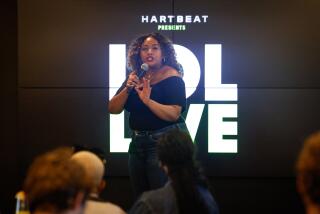THE BOOK ON JOHN CHELEW
- Share via
John Chelew was one of the many devotees of John Hiatt’s solo performances at McCabe’s who felt that the singer’s albums lacked the transcendent shows’ purity, poignancy and punch.
But unlike other Hiatt fans, Chelew did something about it.
Of course, as the person who books the McCabe’s shows, Chelew had one thing most Hiatt fans lacked: access to the performer. Indeed, the two met about a decade ago, when L.A. native Chelew was doing volunteer work at the Santa Monica guitar shop.
Over the years, Chelew maintained at least sporadic involvement with McCabe’s, helping out concert booker Nancy Covey. When she left in 1984, Chelew assumed the booking duties.
Since then, the small concert room in the rear of the shop has continued to develop into a bastion of eclectic, adventurous concert programming. It’s hard to think of many other places where veteran folk guitarist Doc Watson and ex-Pere Ubu leader David Thomas are equally at home.
“I can book the people I want,” Chelew explained, sitting in his office. “The owner trusts me enough to let me book the people I want to. . . . He gives me 100% autonomy.”
One way Chelew has made use of that autonomy is by hiring artists for multiple bookings, such as a monthlong stand of Friday nights or return engagements every few months.
“I really feel people have to play here several times,” he said. “It’s a funny room to play: There’s no smoking or drinking, no cash register, no waitresses walking around, nothing. I think you have to use a different kind of concentration on stage. And it takes a few times to get it right.
“And I think it’s nice to present the same person a number of times, because people get to see the person grow and change. And the person gets real relaxed here and starts doing real well.”
Nashville resident Hiatt is the kind of performer he was talking about. But Chelew thought that the growth that the long-time critical favorite evidenced at his several McCabe’s shows wasn’t reflected in his albums, and he had the temerity to say so.
“Sometimes when I felt bold enough,” Chelew recalled, “I’d say, ‘I sure like your shows, but I sure don’t like your records.’ ”
Just like that, John Chelew the concert booker became John Chelew the producer, in charge of “Bring the Family,” Hiatt’s first album for A&M; Records.
Chelew and Hiatt agreed that an obvious solution would be recording a live album.
“Then,” Chelew recalled, “I started to think, ‘What if I could get the effect of a live solo show on a studio album with other musicians?’
“With John’s solo shows, there’s nothing else going--nothing to distract you. You really hear the songs. You really hear those lyrics. You really get the vocal nuances. But I thought it’d be neat to have a band that could do the same thing--that could be so attentive, so aware of the situation that they would never step on his toes. And who would those people be?”
The answer: guitarist Ry Cooder, drummer Jim Keltner and bassist Nick Lowe. Assembling the stellar band was no small task. As an added burden, the project operated on a hurried, last-minute basis--in part because of time and financial constraints, though some of the pressure was fostered by Chelew to approximate the spontaneity and urgency of a live performance.
It took only four days in February to cut the whole album. Bassist Lowe agreed to participate on only a day’s notice. He flew in from England, rented a bass on the way from the airport and reported to the studio.
Chelew’s previous producer’s experience had consisted of co-producing an album by British folk-rock group Pentangle and one by guitarist Bert Jansch, plus one track on T Bone Burnett’s “Proof Through the Night” LP. Wasn’t presiding over a session staffed by four of the most experienced and respected musicians in rock a mite intimidating?
“Sure, man, I was scared,” Chelew, 36, replied. “Especially since I was working with people like Ry Cooder and Nick Lowe, who’s a world-class producer himself. But they made it real easy for me because they--what’s the word?-- acquiesced .”
With the musicians and engineer Larry Hirsch cultivating a supportive atmosphere, the producer said he quickly shook off his fear and “got more forward as we went along.”
He urged Hiatt to record his vocals while playing guitar (something he’d never done on his albums), and he adamantly opposed the use of keyboards (other than the piano Hiatt plays on “Have a Little Faith in Me”). The keyboard issue definitely tested his mettle: “At various times, all of (the others) were pushing for it,” he said.
Chelew definitely pulled it off, and then some. “Bring the Family” came out in June, and it’s widely considered the best of Hiatt’s eight albums.
Now Chelew is helping coordinate plans for Hiatt’s tour. If the same band that made the record reassembles for the live shows, there are hopes to have rockumentary film maker D.A. Pennebaker (who directed the LP’s first video, “Thank You Girl”) shoot the foursome’s swing through Texas.
Meanwhile, Chelew has a number of his own irons in the fire. A singer-songwriter-guitarist himself, he’s making a demo tape aided by singer Syd Straw. He also collaborated with Peter Case and Victoria Williams on a song about baseball player Pedro Guerrero that may turn up on Case’s next LP. Then there’s his steady job cooking up the diverse menu of concert entrees at McCabe’s.
Ticking off the disparate artists who’ve performed there in recent months--including veteran blues guitarist Brownie McGhee, country guitar-fiddle duo Norman and Nancy Blake, avant-rock guitarist Fred Frith, singer-actor Harry Dean Stanton and local rawk squad Dream Syndicate--Chelew suddenly seemed struck by the diversity of the roster.
“I don’t know what the common thread is, but I think there must be one,” he said. “I’d like to think that a person could come here any night without knowing who was playing, and enjoy it.”
He smiled. “I don’t know who that would be--except me. Maybe that’s the common thread.”
More to Read
The biggest entertainment stories
Get our big stories about Hollywood, film, television, music, arts, culture and more right in your inbox as soon as they publish.
You may occasionally receive promotional content from the Los Angeles Times.










